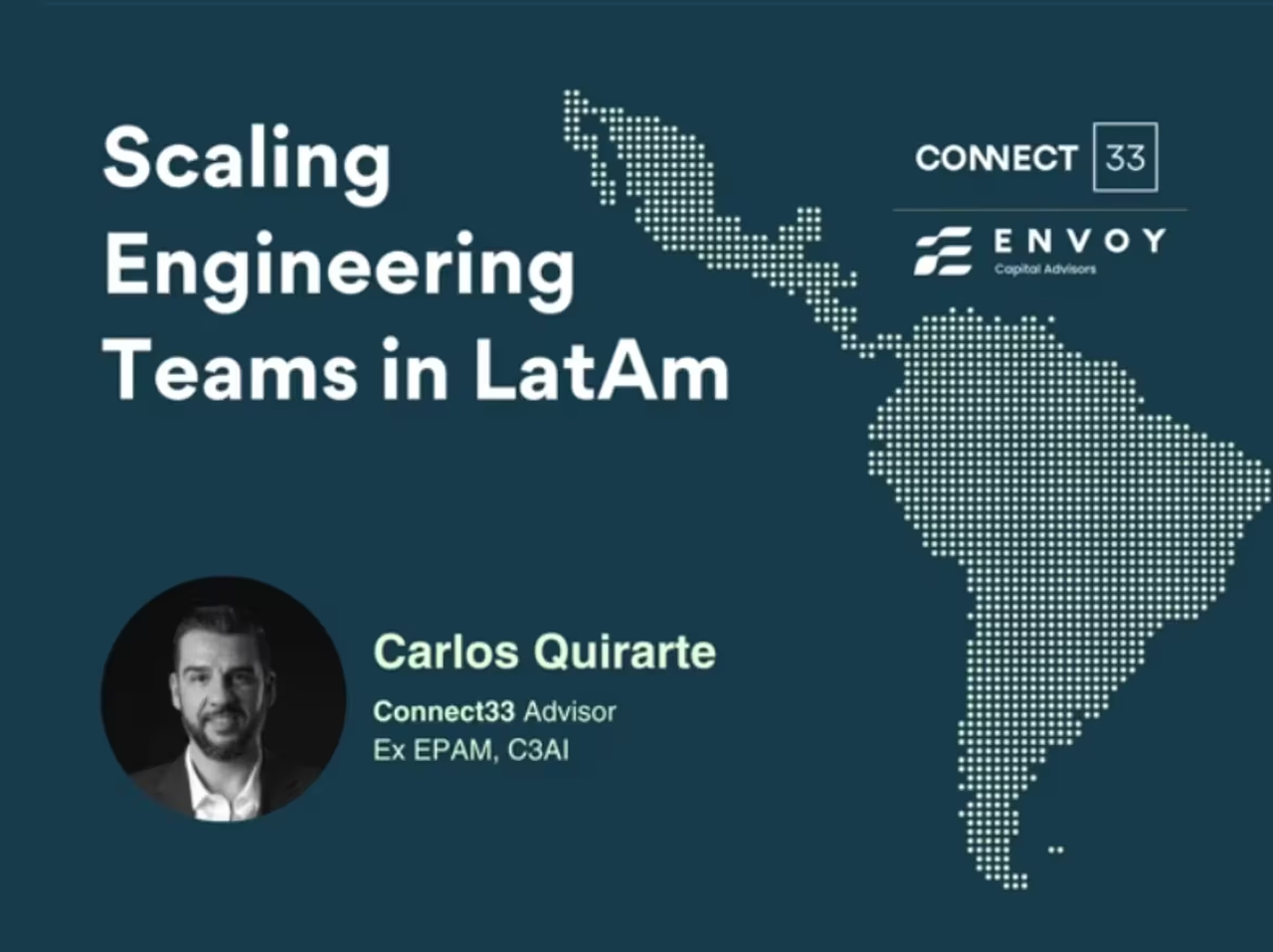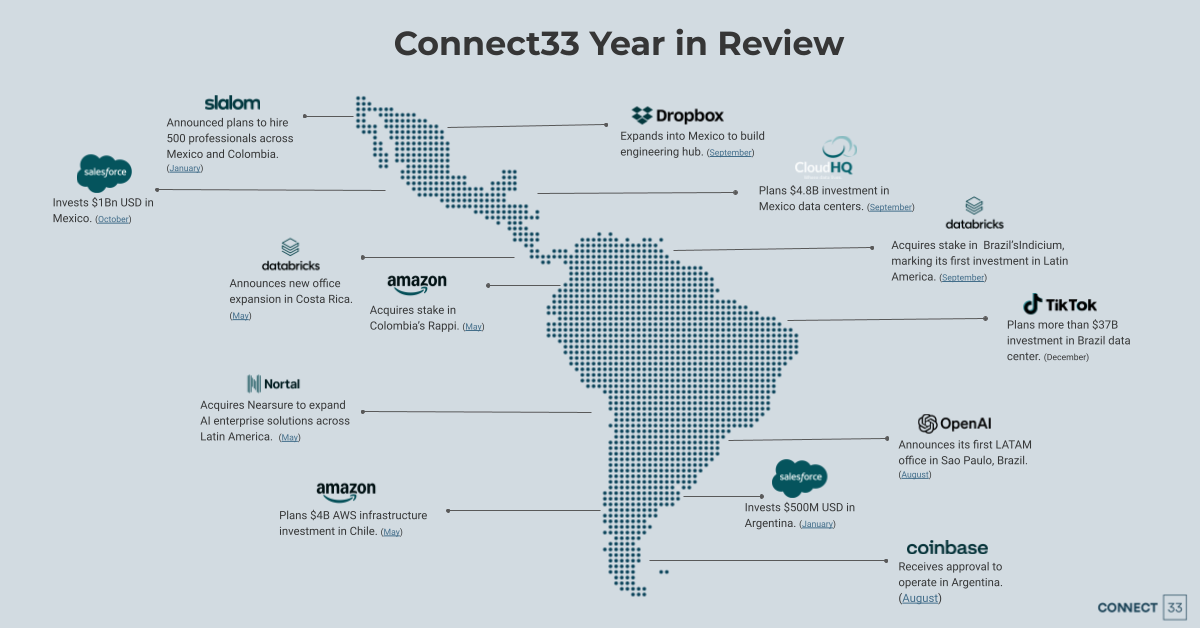Carlos Quirarte is an Advisor at Connect33. Carlos has over 13 years of experience building teams from the ground up to more than 1,000 employees and generating $50 million in revenue. He has a proven track record of helping international companies, including Ooyala, EPAM, and C3 AI, expand into new Latin American markets.
Q&A
Tell us a bit about yourself
My name is Carlos Quirarte. I'm originally from Guadalajara, Mexico, and I have over 20 years of experience helping international companies in the technology sector grow, expand their operations, and scale their teams in Latin America, specifically in Mexico, Guadalajara, Mexico City, Monterrey, and other areas.
I'm currently living in Madrid. I'm starting an MBA in digital transformation and am also an Advisor at Connect33.
What sparked your journey into technology, particularly in helping companies establish a presence in Mexico and Latin America?
My journey started with a passion for building from scratch and empowering local talent. Guadalajara, emerging as the 'Silicon Valley of Mexico,' presented an ideal launchpad for many technology companies.
Early in my career, I saw the region's untapped potential not just in technical skills but also in drive and adaptability. That passion became a mission at Oyala, EPAM, and C3AI, like turning global strategies into local success stories.
What are the critical ingredients for a successful software engineering team-building expansion?
For me, it comes down to three things. One is cultural alignment with global leadership, the second is talent strategy, and the third is scalable operations.
For example, cultural alignment with global leadership is understanding the company's expectations and translating those locally in Mexico. How is it culturally speaking, we can merge and make this work because the company already has its own culture and coming to a brand new region with again a different culture, different language, and different ways of thinking and doing things. That's the piece that is also very, very important to me. And acting as a kind of mediator and as a translator in terms of how is it that things work in Mexico and how things work with the company in other regions or if it's coming from America, how is it that we can combine the strengths and the abilities from both sides and make it work.
Then, in terms of talent strategies, building strong new grad programs and partnerships with the universities, which is something that I did with these three companies, Ooyala, EPAM, and C3AI, allows the companies to work with this talent that is eager to learn and to apply everything that students learned when they were at the university. How can we help them go through the right processes, and how do companies work in real life from a professional standpoint?
In terms of scalable operations, establishing processes early that can grow with you is key. Key KPIs, delivery, governance, documentation, and strong onboarding frameworks are key. This helps us build a very strong foundation, and then, from there, we can grow, which will help us scale. If you don't have these components, it would be challenging or more complex for the company to be successful in any landscape.
How can companies in the US that are looking to expand into LATAM better prepare for that transition?
The main issues are underestimating local complexity, labor laws, and cultural nuances. There's also a misconception that nearshoring is just cost-saving. When done right, it's about quality and strategic value. Preparation requires boots-on-the-ground leadership and investing in a long-term talent pipeline, not just short-term staffing. So, I think it's important that the company is willing to learn to be open-minded and assertive in listening to this.
You've worked with some really big technology players and seen how they think about acquisitions and talent there. What kind of teams or tech are they looking for now in the age of AI?
I think that the profiles have obviously evolved. When I joined Ooyala in 2013, and until now, when I joined C3 in 2022, I wouldn't say it was a completely different profile, but it was very much an upgraded kind of profile. So, I think that what companies value the most is not this cliche about people being passionate about software engineering. It's kind of like a must. It has to be there already, right?
So it's more about being hungry, about continuous learning. Now, with AI, that was one of the main reasons why I was willing to transition my professional career and leave EPAM and join C3 AI because back then, C3AI was basically the only real AI company that was starting or looking to expand their operations into Mexico. Back then, some companies already started talking about AI, but C3 was already working in AI. They already started developing AI applications for global clients.
This allowed us to bring this kind of company to Mexico. The kind of profiles that they were looking for are, obviously, very strong software engineering engineers. But from the very beginning, one of the things I told them, and this is also what I was I could say that I've been lucky that all these three companies trusted me for this important role that I told him from the beginning. We do have like really, really good software engineers and software developers, but they are just starting to learn about AI. I mean, we haven't done. And I was kind of risky by telling them, like, I can assure you that most of them have, haven't worked with AI or real AI or the kind of AI you guys are developing. So you have to understand that, and you have to be open and willing to develop such talent again, train them, and guide them through whatever we are looking to accomplish together as a team. Right. So again, going back to your question is just really good, strong software engineers in terms of understanding the, the real how software works, how's the, what software engineering mean? I have strong technical capabilities, which are very much interrelated to algorithms and data structures.
So that's the foundation because having that, I would say, like the cover, will give you the flexibility to adapt to work with almost any programming language. Right. So that was the kind of thing that the companies were looking for. Yeah, strong software engineers, but with an excellent foundation in algorithms and data structure, which, in most time, most people kind of forget about algorithms and data structure as soon as they start working with or trying to specialize in one programming language.
Most engineers used to say, like, I'm a Java developer, JavaScript developer, Python developer, or whatever. But none of them, I'm really good at algorithms and data structures, and I can move and work with any programming language. So that was like the, one of the, I was like this, what differentiated EPAM and especially C3 when I started working with them.
What did you find most effective for maintaining alignment with management, specifically in terms of skill sets and hiring bar, regarding EPAM and C3 AI?
The two main things are transparency and consistent and constant communication. So, I was always aiming to maintain a rhythm of executive updates and align on measurable outcomes. For example, at C3AI, I work closely with the Redwood City team leadership team to ensure the product and talent goals are met. Also, bringing US leaders to Mexico to build empathy and a shared vision—those kinds of things really help us.
Once the executive team is close to their teams, it's honest and transparent, and they communicate goals on this, like All Hands, coffee talks, or whatever format you want to use. How important that is, and people can feel that level of connection with the executive team when they say, "Oh, this is real, and it's not just like sugarcoating whatever that we're trying to accomplish."
I think those two components are extremely important to make sure that the company has this cultural alignment and that the strategy is there, working, and will help us scale.
My question is about general software engineering hiring in Guadalajara, as you observed. We see this Connect33 all the time when we start working with clients, and they begin interviewing in their respective LATAM market they've expanded into. These hiring managers, engineering leaders in the US, have never hired internationally. How did you go about setting that expectation and getting past that wall of hiring that is more or less always there?
Yeah, so that's interesting because, from one side, it is like in the university. Most universities do not teach you how to develop your soft skills and how to interview well. One of the things that you should say is how you can sell yourself without obviously telling lies or overselling yourself but highlighting your skills, strengths, and abilities.
Most engineers struggle with this, and when they are in an interview, especially when speaking a second language, it's also hard to express yourself and let the interviewer know why they should hire you. Why also why is it that you are interested in the position or in the company itself? This is also one of the things that I've been. When I was, I had a very close relationship with universities in Mexico, especially in Guadalajara.
This was one of the things that I was also asking them and pushing them to do. As part of your programs, you definitely must give them something, I don't know, like a seminar or something that can just provide them with tools on how to develop their soft skills, at least on how to behave properly in an interview. On the other hand, I was again talking to the company, the people from Talent Acquisition, and also with the hiring managers.
Ideally, I would ask them to come to Mexico and do the first interviews in person just so people can understand the culture and environment and have this face-to-face interaction. They can see how people react and behave, their expressions or movements, and a little bit of again, the reactions to questions. This will give them this kind of flexibility and allow them to be more assertive during interviews.
So it has to come back to being willing to learn and understand that, especially if you haven't had this opportunity or this is the first time a hiring manager has hired internationally. Sometimes, it's difficult, and again, it's difficult for both sides, and you have to be willing to manage that. I also think the company should provide different kinds of training to these engineering managers to better interview people internationally, if possible in person, and if not, then how to.




